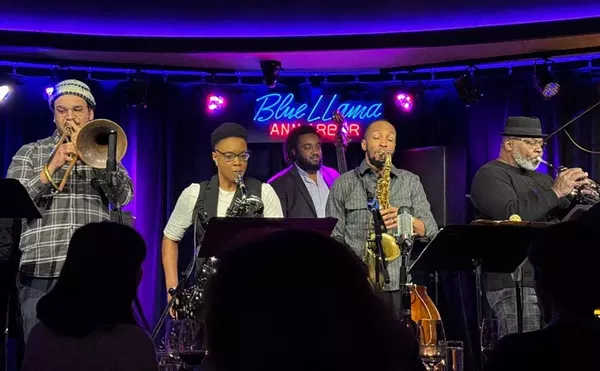With their furious momentum, Miles Davis' early fusion bands have often been compared to freight trains. And as the Greek philosopher Heraclitus said, you can't step in front of the same fusionoid freight train twice — certainly not if it's a great one. That's why the world needs a six-CD set of Miles Davis' 1970 stay at the Cellar Door club, Washington, D.C. At one live set per CD, this is presumably half of what transpired over four smoking nights, annotated with band member remembrances and essays from Bob Belden and Adam Holzman, the musicians behind the box.
At the time of the Cellar Door sessions, the Davis band had evolved by way of the landmark sessions for Bitches Brew and Jack Johnson, live performances at rock palaces like the Fillmores, and the amazing show at the Isle of Wight Festival. Keith Jarrett was soloing expansively on dual, wah-wah enabled electric keyboards; Gary Bartz was channeling Trane in sax solos framed by drummer Jack DeJohnette, who was following with Miles' instructions to blend Buddy Miles' directness with his own abundant technique. On bass was Detroiter Michael Henderson — out of Stevie Wonder's band — giving a funky anchor to what sometimes amounted to a musical storm. Brazilian percussionist Airto Moreira added colorful commentary, while presiding over all, of course, was Miles with his wah-wah trumpet wail. And for the final night, guitarist John McLaughlin was recruited for an extra electric crackle.
Of this, one intact selection from a McLaughlin set was released on 1971's Live-Evil, and three more of Live-Evil's cuts are lengthy splice-and-dice Teo Macero concoctions from that night. None of the rest has been previously released.
The one caveat to a prospective buyer is that repertoire for Miles had long been secondary to performance. This band jams on just six tunes (not much more than melodic snippets and rhythm patterns at that), gives Jarrett long solos to introduce one of them, and sometimes throws in a couple of minutes or less of Wayne Shorter's "Sanctuary." Five of six sets begin with Joe Zawinul's "Directions"; three of the five follow with "Honky Tonk" and "What I Say" in that order, etc. Afraid of monotony? Save your money. But it's not so much what they played, it's how they played. Wow.
W. Kim Heron is the managing editor of Metro Times. E-mail [email protected].






